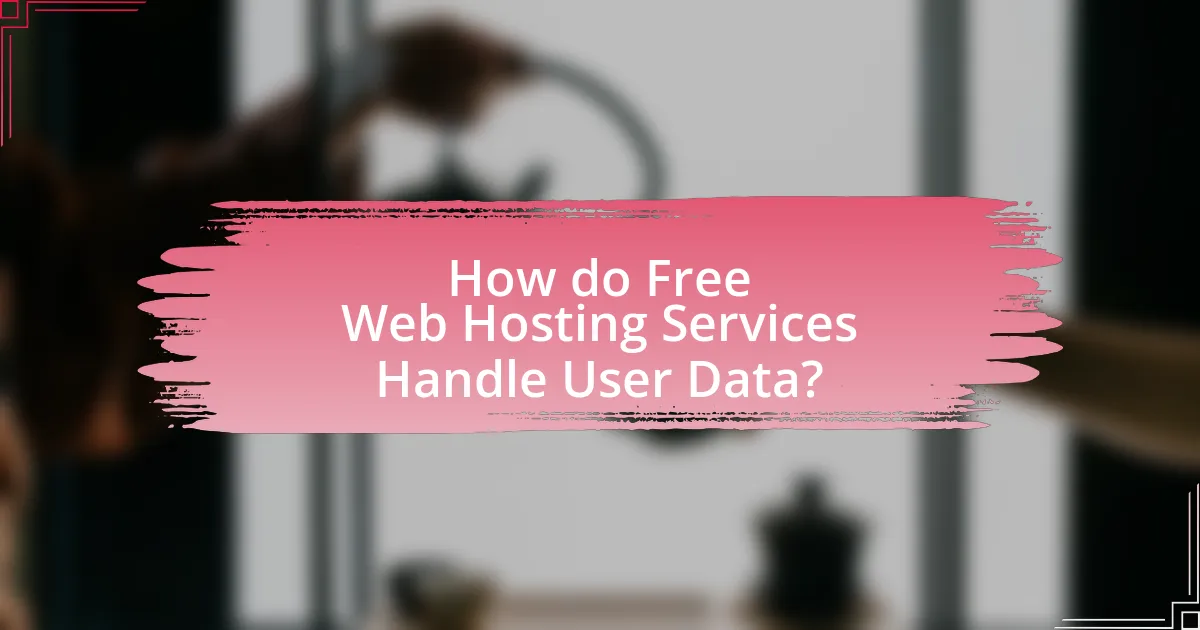Privacy policies in free web hosting services are crucial legal documents that detail how user data is collected, used, stored, and protected. These policies inform users about their rights and the potential risks associated with data sharing, particularly with third parties for advertising purposes. Key elements to consider include transparency, data usage, retention policies, and user rights, which are essential for understanding how personal information is handled. The article also explores common practices in privacy policies, variations among different providers, and the implications for user privacy, emphasizing the importance of reviewing these policies to safeguard personal data. Additionally, it provides guidance on how users can protect themselves from unwanted data sharing and manage their privacy effectively while using free web hosting services.

What are Privacy Policies in Free Web Hosting Services?
Privacy policies in free web hosting services are legal documents that outline how these services collect, use, store, and protect user data. These policies are essential for transparency, informing users about their rights and the handling of their personal information. For instance, many free web hosting providers may monetize their services through advertising, which often involves tracking user behavior and data sharing with third parties. According to a study by the Electronic Frontier Foundation, many free services have been found to share user data with advertisers, highlighting the importance of reviewing privacy policies to understand potential risks.
Why are Privacy Policies important for users of free web hosting services?
Privacy policies are important for users of free web hosting services because they outline how user data is collected, used, and protected. These policies inform users about potential risks, such as data sharing with third parties or the use of personal information for advertising purposes. For instance, a study by the Electronic Frontier Foundation highlights that many free services monetize user data, making it crucial for users to understand their privacy rights and the implications of using such services. By reviewing privacy policies, users can make informed decisions about their data security and privacy.
What key elements should users look for in these policies?
Users should look for transparency, data usage, data retention, third-party sharing, and user rights in privacy policies of free web hosting services. Transparency ensures that users understand how their data is collected and used. Data usage details inform users about the specific types of data collected, such as personal information or usage statistics. Data retention policies clarify how long user data will be stored, which is crucial for understanding potential risks. Third-party sharing clauses reveal whether user data is shared with external entities, impacting user privacy. Lastly, user rights sections outline what users can do regarding their data, including access, correction, and deletion rights, which are essential for maintaining control over personal information.
How do privacy policies protect user data in free web hosting services?
Privacy policies protect user data in free web hosting services by outlining how user information is collected, used, and shared. These policies typically specify the types of data collected, such as personal identification information and usage data, and detail the measures taken to safeguard this information, including encryption and access controls. For instance, a study by the Electronic Frontier Foundation highlights that clear privacy policies can enhance user trust and compliance with data protection regulations, ensuring that users are informed about their rights and the service provider’s obligations.
What common practices are found in the privacy policies of free web hosting services?
Common practices found in the privacy policies of free web hosting services include data collection, user consent, and third-party sharing. Free web hosting services typically collect personal information such as email addresses, IP addresses, and usage data to provide their services and improve user experience. User consent is often obtained through acceptance of terms and conditions during the registration process, which outlines how the collected data will be used. Additionally, many free web hosting services disclose that they may share user data with third parties for advertising, analytics, or service improvement purposes, which is a standard practice in the industry to monetize their offerings.
How do these practices vary between different providers?
Practices regarding privacy policies vary significantly between different free web hosting service providers. For instance, some providers may prioritize user data protection by implementing strict data encryption and not sharing user information with third parties, while others may monetize user data through advertising or sell it to third parties. A study by the Electronic Frontier Foundation highlights that providers like InfinityFree emphasize user privacy, whereas others, such as 000webhost, have been noted for less stringent privacy practices, including data retention policies that allow for longer storage of user information. This variation is influenced by each provider’s business model, regulatory compliance, and commitment to user privacy.
What are the implications of these practices for user privacy?
The implications of practices in free web hosting services for user privacy include potential data exposure and misuse. These services often monetize through advertising and data collection, leading to the possibility of user information being shared with third parties without explicit consent. For instance, a study by the Electronic Frontier Foundation found that many free hosting platforms track user behavior and store personal data, which can be vulnerable to breaches. This raises significant concerns about the security of sensitive information and the overall trustworthiness of such services.

How do Free Web Hosting Services Handle User Data?
Free web hosting services typically handle user data by collecting, storing, and sometimes monetizing it through advertising or selling to third parties. These services often have privacy policies that outline their data practices, which may include tracking user activity, collecting personal information, and using cookies for targeted advertising. For instance, a study by the Electronic Frontier Foundation found that many free hosting providers share user data with advertisers, which raises concerns about privacy and data security. Users should carefully review the privacy policies of these services to understand how their data will be used and protected.
What types of user data are typically collected by free web hosting services?
Free web hosting services typically collect user data such as email addresses, IP addresses, and usage statistics. These services often require users to provide an email address for account creation and communication purposes. IP addresses are collected for security and analytics, helping to monitor traffic and detect potential abuse. Additionally, usage statistics, including page views and session duration, are gathered to improve service performance and user experience. This data collection is commonly outlined in the privacy policies of these services, ensuring transparency regarding user information handling.
How is this data used by the service providers?
Service providers use this data primarily to enhance user experience and optimize their services. By analyzing user behavior, preferences, and interactions, they can tailor their offerings, improve website performance, and deliver targeted advertisements. For instance, a study by the Pew Research Center indicates that 79% of users are concerned about how their data is used, highlighting the importance of transparency in data utilization. This data-driven approach allows service providers to make informed decisions, ultimately leading to increased user satisfaction and retention.
What are the potential risks associated with data collection?
The potential risks associated with data collection include unauthorized access, data breaches, and misuse of personal information. Unauthorized access can occur when data is not adequately protected, leading to sensitive information being exposed to malicious actors. Data breaches have become increasingly common; for instance, the Identity Theft Resource Center reported over 1,100 data breaches in the U.S. in 2020 alone, affecting millions of individuals. Misuse of personal information can happen when collected data is sold or shared without consent, violating privacy rights and potentially leading to identity theft or targeted scams. These risks highlight the importance of robust data protection measures and transparent privacy policies in free web hosting services.
How do free web hosting services share user data with third parties?
Free web hosting services typically share user data with third parties through data monetization practices, which often include selling user information or using it for targeted advertising. These services often include clauses in their privacy policies that allow them to collect, analyze, and share data such as IP addresses, browsing habits, and personal information with advertisers and partners. For example, a study by the Electronic Frontier Foundation highlights that many free hosting providers explicitly state in their terms that they may share user data with third parties for marketing purposes, thereby enabling targeted ads based on user behavior.
What are the common reasons for sharing user data?
Common reasons for sharing user data include targeted advertising, service improvement, and compliance with legal obligations. Companies often share user data to create personalized advertising experiences, which can increase engagement and revenue; for instance, 70% of marketers report that targeted ads yield higher conversion rates. Additionally, user data is shared to enhance services by analyzing usage patterns and improving features, as seen in tech companies that utilize feedback for product development. Lastly, sharing data may be necessary to comply with regulations such as GDPR or CCPA, which mandate transparency in data handling practices.
How can users protect themselves from unwanted data sharing?
Users can protect themselves from unwanted data sharing by carefully reviewing and adjusting privacy settings on their accounts. By accessing the privacy settings of their online accounts, users can limit the amount of personal information shared with third parties. Additionally, users should opt out of data sharing options whenever possible, as many services provide this choice during account setup or within account settings. Research indicates that 79% of internet users are concerned about how their data is being used, highlighting the importance of proactive measures in data privacy.

What Should Users Consider When Choosing a Free Web Hosting Service?
Users should consider the privacy policies of free web hosting services to ensure their data is protected. Many free hosting providers monetize their services by collecting user data, which can lead to privacy concerns. For instance, a study by the Electronic Frontier Foundation highlights that numerous free web hosting services may share user information with third parties, potentially compromising user privacy. Additionally, users should evaluate the terms of service to understand how their data will be used and whether they have control over it. This scrutiny is essential, as inadequate privacy measures can expose users to risks such as data breaches or unauthorized access.
What questions should users ask about privacy policies before signing up?
Users should ask the following questions about privacy policies before signing up for free web hosting services: What personal information is collected? This question is crucial because it helps users understand the extent of data being gathered, which can include names, email addresses, and payment information. How is the collected information used? Knowing the purpose of data collection clarifies whether it is for service improvement, marketing, or other uses. Who has access to the information? This question reveals if third parties, such as advertisers or partners, can access user data, which raises concerns about data sharing practices. What security measures are in place to protect personal information? Understanding the security protocols helps users assess the risk of data breaches. Can users delete their data, and what is the process? This question is important for users who want control over their personal information. Lastly, how does the service comply with relevant data protection laws? This ensures that the hosting service adheres to regulations like GDPR or CCPA, which protect user privacy rights.
How can users evaluate the transparency of a service’s privacy policy?
Users can evaluate the transparency of a service’s privacy policy by examining the clarity and comprehensiveness of the information provided. A transparent privacy policy should clearly outline what personal data is collected, how it is used, who it is shared with, and the measures taken to protect it. According to a study by the International Association of Privacy Professionals, 70% of users prefer policies that are written in plain language and are easy to understand. Additionally, users should look for specific sections addressing user rights, data retention periods, and contact information for privacy inquiries, as these elements indicate a commitment to transparency.
What red flags should users be aware of in privacy policies?
Users should be aware of several red flags in privacy policies, including vague language, lack of data protection measures, and excessive data collection. Vague language can obscure the true intentions of the service provider, making it difficult for users to understand how their data will be used. A lack of stated data protection measures indicates potential risks in how user information is safeguarded. Additionally, if a privacy policy outlines the collection of excessive personal information that is not necessary for the service, it raises concerns about user privacy and potential misuse of data. These red flags highlight the importance of scrutinizing privacy policies to ensure user data is handled responsibly.
What best practices can users follow to enhance their privacy while using free web hosting services?
To enhance privacy while using free web hosting services, users should utilize a virtual private network (VPN) to encrypt their internet connection. A VPN masks the user’s IP address and secures data transmission, making it difficult for third parties to track online activities. Additionally, users should avoid sharing personal information during the registration process, opting for pseudonyms or minimal data instead. This practice reduces the risk of personal data exposure. Furthermore, users should regularly review the privacy policies of the hosting service to understand data handling practices and ensure compliance with privacy standards. Research indicates that many free hosting services monetize user data, making awareness of these policies crucial for maintaining privacy.
How can users manage their data settings effectively?
Users can manage their data settings effectively by regularly reviewing and adjusting their privacy preferences within the web hosting service’s dashboard. This includes enabling or disabling data sharing options, setting permissions for third-party access, and utilizing any available tools for data encryption. Research indicates that users who actively engage with their privacy settings are more likely to protect their personal information, as highlighted in a study by the Electronic Frontier Foundation, which emphasizes the importance of user awareness in data management.
What tools or resources are available to help users protect their privacy?
Users can utilize various tools and resources to protect their privacy, including VPNs, encrypted messaging apps, and privacy-focused web browsers. VPNs, such as NordVPN and ExpressVPN, encrypt internet traffic, making it difficult for third parties to track online activities. Encrypted messaging apps like Signal and WhatsApp provide end-to-end encryption, ensuring that only the intended recipients can read messages. Privacy-focused web browsers, such as Brave and Firefox, block trackers and enhance user anonymity while browsing. These tools are essential for safeguarding personal information against unauthorized access and surveillance.















